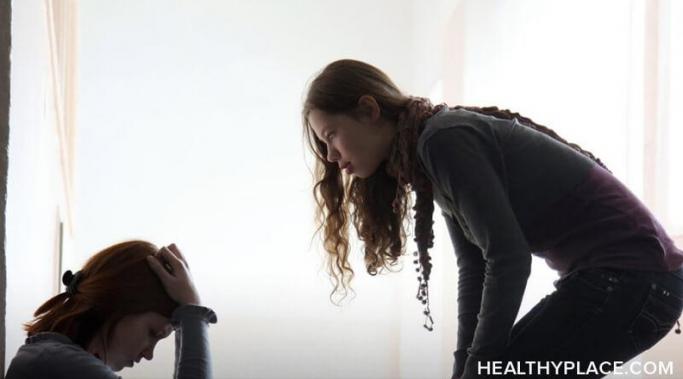Blogs
First, let me pull out my Thesaurus (I have not done this for. . .a month? Two? Long overdue?) to define the word impulse and then we'll narrow it down a bit--a lot. We'll apply it to mental illness and shake the word up a bit.
Prescription drug abuse and addiction is an epidemic. It affects people from all walks of life, all ages, races, ages, backgrounds, socioeconomic standing, etc. There is a huge rise across the country in the numbers of nonmedical use and abuse of prescription drugs. It is important to understand that prescription drug abuse is defined as “the use of a medication without a prescription, in a way other than as prescribed, or for the experience or feelings elicited.”
When you are out in public, does social anxiety (aka social phobia) have you worried and stressed? Inside this video is a tip to help turn around the social anxiety. It's a skill you readily know and can do, no matter what your comfort zone might be. Observe people.
Mystery surrounds victims of domestic violence and abuse. “Why does she stay?” tops the list of most asked questions when she’s in the relationship and “What is wrong with her?” is the often unspoken follow-up. It seems to me that most people who study domestic violence victims ask “What is wrong with her?” at the top of their research. They seem to forget that it takes two people to create an abusive relationship.
I guess they think they’ve got the abuser pegged. He’s a narcissist, addict, chauvinist, controller, or has an anger problem or self-esteem issues. Pick a personality or mood disorder and maybe he’s got it. Case closed - on to their victims.
For Better of Worse? Yes, that's the vow. But when the symptoms of mental illness seem to change the personality - the very soul - of your husband or wife, how do you keep going? How do you hold the family together?
Natasha Tracy is not, in fact, my real name. It’s a nom de plume. Writers have a long history of writing under pen names for a whole variety of reasons but one of them has always been judgement. People will judge you, as a person, by what you write. Write erotica, for example, and get yourself a reputation as a slut.
And as a mental health writer, I face similar stigma. True, people aren’t likely to make inferences about my sexual nature (although it has happened) but they will make judgements about me as a person and certainly as an employee.
Because no matter how much I write about stigma and no matter how open people appear to be, a person with a mental illness is simply always assumed to be unequal to someone without a mental illness. Their point of view is always considered to be tainted by their illness. Their thoughts are never considered to be their own.
In my last post The Experience of Depression: The Flip-Side of Mania I focused on both depression and, you guessed it, mania. I have a secret: I'm not feeling so great. I am clinically depressed.
I love when reader's ask questions about anxiety. I want to write about what you want to know. Anxiety symptoms and treatment can be very specific to the sufferer, but I will try to answer so that most readers who experience anxiety can take away something. I had two questions last week. Here is the first one:
I’ve been getting my mail in Cookoopantsatopolis for a very long time now, and the fact of the matter is, I like it here. The people are nice, you laugh a lot, it’s never boring, and, frankly, you have experiences unavailable elsewhere.
Another thing. My fellow Cookoopantsatopolis-dwellers are special, they have been through astounding trials and voyages which have given them depth, soul, and character. Now, I don’t mean to suggest that Cookootoplians are better than square white bread eating mayonnaise-loving Johnny and Jane Lunchbuckets; but I wouldn’t stop you from saying so.
I guess my point, assuming I have one, is that we all must struggle to know who we are, accept who we are, love who we are and enjoy being who we are. This goes double for Cookoolians who have had to endure harsh judgment not merely for what they do, but for their very being.
I Just Want To Be Normal
As you move through the various levels of recovery, you may begin to identify with “normal” people, you may even start to believe there is something desirable about being one of them. If left unchecked, this slippery slope will dump you on the doorstep of Squaresville, man – in peril of losing your identity altogether.
Don’t let this happen to you! Be on the lookout for these warning signs.
During the bulk of my abusive marriage, I didn't realize how isolated I was, but I did recognize the fact that other families weren't like mine. The shame of not knowing how to fix my problems overwhelmed me, and the frustration of having no one to talk to hurled me into depression. The guilt of being ill-functioning for my children and husband kept me low. It was a devastating downward spiral that ended only after I realized I was not alone in my struggles.
Perhaps my "aha moment" would have come more quickly if Band Back Together, the website created by Becky Sherrick Harks, was available to me then. Known as Aunt Becky to the Internet, Sherrick Harks created a website called bandbacktogether.com and invites everyone suffering from trauma, sickness, mental illness or abuse to share their story online [Note: As of right now, the website is hacked and not available, Sep. 29, 2017].









